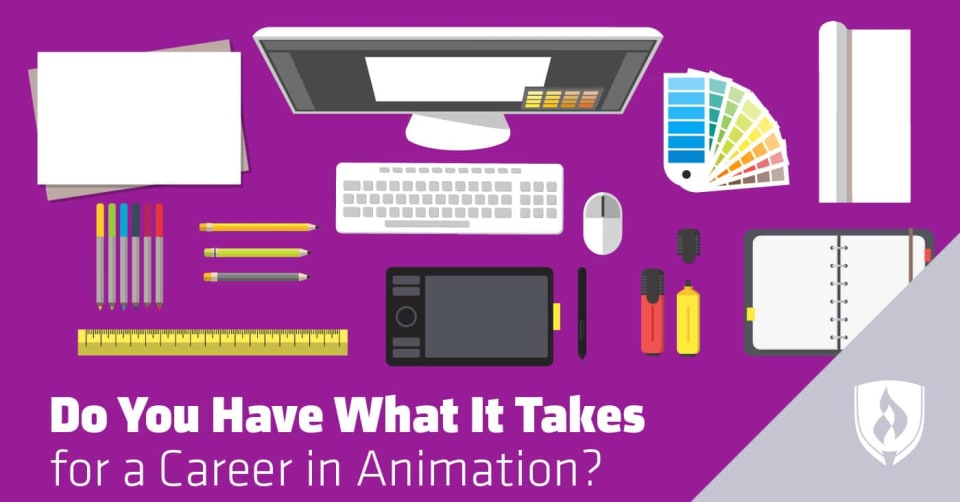
Unlike you and me, Buzz Lightyear wasn’t born in a day. In fact, the charismatic space cadet from Toy Story cherished by children everywhere was intricately designed on a computer screen by an army of animators. That adored astronaut is actually just a series of still images manipulated to create the illusion of movement.
And it’s not just children’s cartoons either. Animators play integral, behind-the-scenes roles on projects spanning from action movies and video games to television commercials, websites and mobile applications. Animation careers exist in all sorts of industries.
In such a specialized and competitive field, it’s important to be sure you’ve got the chops to succeed before investing your time and energy into pursuing an animation career path. To help get you up to speed with the industry, we compiled some need-to-know information for you.
What does an animator do, anyway?
Animators, also known as multimedia artists or motion graphics specialists, create special effects, animation or other visual images using computers or other electronic tools for products or creations, according to the U.S. Department of Labor (DOL).1
As you know, animators help create television shows, movies and video games. But besides the obvious, there are many lesser-known animation careers out there. “I grew up thinking that animators all worked for a movie studio or cartoon show studios, and it is simply not the case,” says Jordyn Bowers, 3D Animator for InventHelp.
“Animators are everywhere,” Bowers explains. “Animators do commercials, motion graphics, special effects, advertisements on the internet, medical explanations, recreating crime scenes for forensics … there are too many to list!”
For instance, one of Bowers’ roles is to create videos of 3D renderings and computer-generated animation to illustrate the main function of an invention idea. These Virtual Invention Presentations give viewers a better understanding of how an invention would work.
Some other unique examples of animation jobs include designing animated graphics for websites, producing simulations for military practices and creating virtual tours of building architecture or model homes. Put simply, an animation career path could lead in many different directions. Want to read more about what does an animator do? Read more here.
What are some characteristics of a successful animator?
If you’re considering pursuing a career in animation, the next step is to consider whether you have the inherent qualities that lend themselves well to the profession. Of course there will be some technical training required, but it helps to know you might already be a natural fit.
“Animation is no easy task,” Bowers says. “It is tedious and a longer process than generally perceived.” She emphasizes that animation is a mixture of art and science. In order to thrive, you must have an artistic eye but also enjoy breaking things down to see how they work. “Animation is often the combination of understanding mechanics and making them artful,” she adds.
For example, a non-animator might not notice the stranger in line ahead of them at a coffee shop. But a true animator sees details and might analyze that individual—from their posture and facial expressions to the way they walk and talk.
Another key to success is having the patience and creativity to plan your projects well. “The layout is the piece of work where I find myself thinking the most creatively,” Bowers explains, adding that the pacing of an animation can determine whether it will feel pleasing or cringe-worthy. “This all depends on the amount of planning involved beforehand,” she says. “I enjoy placing the puzzle pieces together in the order that will best represent the product.”
Additionally, animators should possess an observant eye, as well as the willingness to continually improve the way they observe form and space. “The traditional methods of animation in the education process are extremely important,” Bowers says. “Animators have to have a great understanding of a form in 3D space, whether it be transferring that manually or digitally.”
What are the technical skills needed in animation?
Perhaps you’ve discovered you possess the natural characteristics needed to succeed in an animation career. But you’re not quite in the clear yet. Those qualities are useless if they aren’t accompanied by the requisite technical skills for animation.
In order to give life to their creative ideas, animators must utilize both the artistic right and analytical left side of their brains. You’ll need to possess the perfect combination of practical skills and software savvy to flourish in this field.
Skill in animation itself is a must. “3D animation skills are very key to animation at the moment,” Bowers says. “Becoming skilled in programs such as 3DS Max and Maya are important to furthering yourself in the field.”
Animation skills in demand
We used real-time job analysis software to examine more than 8,800 animator job postings from the past year. The data revealed the top 10 skills employers are seeking in candidates.
Here’s what we found:2
- Adobe Creative Suite®
- Motion graphics
- Social media
- Maya®
- Interaction design
- Typesetting
- 3D modeling
- Prototyping
- UX wireframes
- Cinema 4D®
Don’t be intimidated by the list above. These are precisely the types of skills you can acquire through completing a formal design program.
Ready to start on your animation career path?
Bringing dynamic images to life is an exciting job, but animation careers aren’t exactly a walk in the park. Many animators work long hours, including nights and weekends, to adhere to strict deadlines. But if you’re passionate about animation and determined to succeed, the high-pressure, fast-paced environment shouldn’t faze you one bit. If you're interested in pursuing a career in animation, exploring reputable "Animation Courses" can provide you with the necessary skills and knowledge to thrive in this field.
If you’re ready to take the first step on your animation career path, visit our Graphic Design degree page to learn more about how this program can set you up for success.
If you’re still not quite sure this is the right path for you, check out our article, "6 Signs You Should Be Working in Animation." as well as "how to become a visual effects artist."
1Bureau of Labor Statistics, U.S. Department of Labor, Occupational Employment Statistics, [accessed March, 2020] www.bls.gov/oes/. Information represents national, averaged data for the occupations listed and includes workers at all levels of education and experience. This data does not represent starting salaries. Employment conditions in your area may vary.
2Burning-Glass.com (analysis of 8,842 animator job postings, Mar. 01, 2019 – Feb. 29, 2020).
EDITOR'S NOTE: This article was originally published in September 2013. It has since been updated to include information relevant to 2020. Insight from Bowers remains from original article.
Adobe Creative Suite is a registered trademark of Adobe, Inc.
Cinema 4D is a registered trademark of Maxim Computer
Maya is a registered trademark of Autodesk, Inc.




